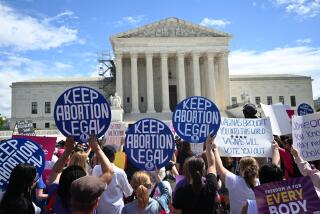Give Garry Wills that old-time religion
Once upon a time, in a faraway land, there lived a man named Garry Wills...
Garry Wills’ recent L.A. Times Op-Ed article “Abortion isn’t a religious issue,” in which he claims that abortion is not a religious issue, might as well have begun with these fanciful words, because the article is as imaginative a bit of fiction as anything the Brothers Grimm could have penned only significantly less entertaining.
In his essay, Wills cherry-picks Thomas Aquinas’ theology; employs a simplistically idiosyncratic interpretation of Scripture and massacres history, science and philosophy, all in a fevered attempt to assert that people of faith should kneel at the altar of secularism because, he argues, Christian opposition to abortion is a Johnny-come-lately moral position founded on little more than thin air and pious politics.
Oh, really.
Neither faith nor reason supports Wills’ claims.
Scripturally, the basis of Christian condemnation of abortion comes not only from the commandment “Thou shalt not kill,” as Wills asserts, but from the fact that the Bible considers children a supreme gift and blessing from God. One does not reject a gift from God lightly. Jeremiah 1:5 tells us that God knew us in the womb, and Exodus 21:22-23 imposes a penalty for those who cause the miscarriage of a fetus. Likewise, the scriptural case against abortion is drawn directly from biblical prohibitions against witchcraft. Hags who hawked their wares in the early days of Christianity claimed power over death and life. Contraceptive and abortifacient potions, and poisons to hasten the death of the inconvenient, were what paid the rent for every self-respecting, union card-carrying witch in the Western world. When St. Paul listed his denunciations of witchcraft immediately after his condemnations of specific sexual sins ( Galatians 5:19-21), early Christians understood exactly what he was talking about.
The argument against abortion from historical Christianity is even stronger. In his book, The Rise of Christianity,” sociologist Rodney Stark, relying heavily on secular historical data, argues that Christianity grew as rapidly as it did precisely because of its strong pro-life ethic, which stood in direct contrast to the Roman culture of death. Abortion was a common killer of both fetuses and women in secular Roman society. Archaeologists have discovered Roman sewers clogged with the bodies of babies. Christianity condemned such practices from the beginning and was viewed as a sanctuary by pagan women who were drawn to the Christian faith out of a desire to protect themselves and their children from a secular world that treated both as disposable goods instead of as children of God entitled to their own rights and dignity.
Similarly, the body of Christian writings is clear on abortion from the earliest days. In 1st century Christianity, the collected teachings of the Apostles known as the Didache states, “Thou shalt not murder a child by abortion.” It also states, “The Way of Death is filled with people who are ... murderers of children and abortionists of God’s creatures.”
In the 2nd century, St. Clement of Alexandria argued, “Women who ... use abortive drugs which expel the child completely dead, abort at the same time their own humanity.”
St. Basil the Great (AD 330-379) wrote, “She who has deliberately destroyed a fetus has to pay the penalty of murder ... those, too, who give drugs causing abortion are deliberate murderers themselves, as well as those receiving the poison which kills the fetus.”
St. Jerome (AD 342-420) wrote, “Some, when they learn that they are with child through sin, practice abortion by the use of drugs. Frequently they die themselves and are brought before the rulers of the lower world guilty of three crimes: suicide, adultery against Christ and murder of an unborn child.”
Wills cites the tired, old progressive trope that Aquinas argued abortion wasn’t murder. It is true that during the time of Aquinas, theologians debated whether abortion was the same sin as murder, but no one doubted it was still a sin. Ultimately, because the argument that abortion was the same as murder had both Christian tradition and science on its side, it was reasserted as the accepted teaching after a period of thoughtful debate.
In any case, stating “Aquinas said” is not the same as saying “Christendom said” or even “the Catholic Church said.” The church did not accept his arguments wholesale. For instance, the church ultimately rejected Aquinas’ arguments against the immaculate conception of the blessed Virgin Mary. Indeed, Wills’ own championing of Aquinas would be a touch more credible if he were equally enthusiastic of Aquinas’ arguments that both contraception and homosexual sex are gravely sinful and that only men can be ordained to the priesthood.
If Wills’ arguments from Scripture and tradition are patently ignorant, his butchering of science and philosophy is simply embarrassing. Wills states that the fetus is human life “just like” a piece of hair is human life. That’s like saying a seat cover is a mode of transportation “just like” a car is a mode of transportation because it decorates the car and moves when the car does. Hair is part of a living organism, but it is not alive in the same sense that a person is. Something that is merely part of the whole does not share the same essence as the whole.
All the way back in the 2nd century, the great Christian teacher Tertullian wrote, “Now we allow that life begins with conception because we contend that the soul also begins from conception; life taking its commencement at the same moment and place that the soul does” Aquinas decided to revisit this issue in light of the best 13th century embryology, but we’ve learned a little since then. Catholicism clearly and consistently states that both ensoulment and personhood begin at conception. Christianity unwaveringly asserts that personhood is not the product of human intellect, reason or function, as Wills argues. Rather, Christians believe that personhood is an essential part of having been created human in the image and likeness of God.
Wills, confident that he has torn down the crucifix, attempts to place a statue of the Goddess of Reason in its place, but even there he fails. He argues the woman needs to be given the choice to decide when and whether she is carrying a fetus or a person. So, by some amazing act of cognitive voodoo, it is the woman’s choice that decides when human personhood begins? Why then, restrict the woman’s choice to the womb? Some philosophers, like Princeton’s Peter Singer, have the courage of Wills’ convictions, extending a woman’s choice to end a life all the way through birth and infancy. Using his own argument, there is no logical reason Wills should deny a woman’s right to infanticide. After all, qualified people disagree here too. In addition to Singer, no less a personage than James Watson, Nobel Prize-winning co-discoverer of DNA, has advocated infanticide in cases of neonatal imperfection or retardation. Wills himself takes potshots at the case of Terri Schiavo, who was obviously out of the womb. Any number of people would argue that simply making it out of the chute does not qualify one to claim that he or she possesses a human life. So, who is a person and when? If we had followed Wills’ recommendation to let the mother decide, Terri Schiavo would certainly have fared better.
Which brings us back to the role of religion in the abortion debate. Wills particularly takes aim at the moral positioning of evangelicals, and he is right that because the evangelicalism of the 20th century tends to have little regard for either natural law or apostolic tradition, its moral positions are largely unmoored. But evangelicals’ spiritual and moral wisdom continues to be nourished by these ancient traditions upheld by more traditional forms of Christianity.
That said, I would actually agree with Wills that abortion is not a religious issue. As the pro-life atheist Nat Hentoff would no doubt argue, abortion is a human issue. Each time a child is killed through abortion, the bell tolls for us. And yet, history has shown us that abortion is a human issue to which only religion can competently and consistently respond. It is the job of religion to assert the dignity of even those who superficially appear to be supremely undignified. It is the job of religion to insist that each person has a right to life even when we wish it were not so. It is the job of religion to assert that “all men are created equal” a revealed truth if ever there was one for quite obviously they are not.
Indeed, some truths can only be revealed, and in the face of scientific disagreement on the nature and origin of personhood, only religion has the courage to go where agnostics fear to tread.
Gregory Popcak is the executive director of the Pastoral Solutions Institute, host of the nationally syndicated radio program “Heart, Mind and Strength” and author of eight books integrating Catholic theology and counseling psychology, including the forthcoming book, “Holy Sex!” He can be reached through the website www.ExceptionalMarriages.com.
More to Read
A cure for the common opinion
Get thought-provoking perspectives with our weekly newsletter.
You may occasionally receive promotional content from the Los Angeles Times.






